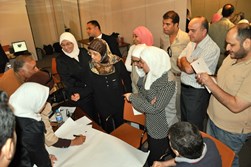 27 October 2015, Cairo, Egypt – In an effort to improve health service utilization by Syrian refugees in Egypt, WHO recently held a two-day team building and leadership course for key members of Syrian associations and NGOs supporting health care services in communities.
27 October 2015, Cairo, Egypt – In an effort to improve health service utilization by Syrian refugees in Egypt, WHO recently held a two-day team building and leadership course for key members of Syrian associations and NGOs supporting health care services in communities.
Syrians in Egypt face an overstretched and fragmented national health system that is not easy to access. Dialect barriers and transport issues make health care even more difficult to obtain in some areas. Leaders of Syrian associations are committed members of their communities who serve as information sources for Syrian refugees seeking health care and health advice. They play a vital role as advocators and mediators between their communities and Ministry of Health authorities, WHO, and civil society organizations working to address refugee needs. Confusion over the roles and responsibilities of these associations threatened the cohesion of health support coordination systems and the meeting provided an opportunity to re-unify groups and strengthen team and individual collaborative and planning skills.
“Regrouping, harmonizing group activities and increasing leadership capacities across organizations is essential in improving health response effectiveness on the ground,” said WHO Egypt technical officer Dr Gasser El Kareem. “More effective communication between teams will help to inform planning, and improve advocacy and coordination, which will ultimately help more displaced Syrians access the available health services to which they are eligible,” he said.
Egypt now hosts 132 000 registered Syrian refugees most of whom reside in Cairo, Giza, Alexandria, Sharkia, Damietta and Qalyubia governorates.
WHO continues to assist the Egyptian Ministry of Health in providing health care services to Syrian refugees in Egypt, and through the provision of technical guidance and support.


